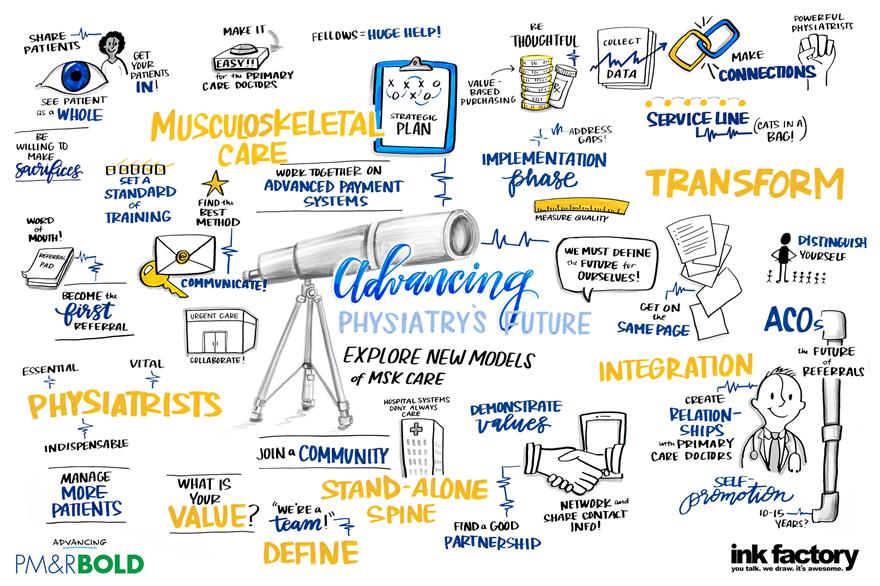The vision for the specialty offers exciting new opportunities for physiatry and will be realized in different ways across the field's diverse practice settings. To help move the vision forward, AAPM&R has enlisted the assistance of member physiatrists to develop envisioned futures for practice areas addressing this key question:
How will practices look different in the future when aligned with this vision?
In Musculoskeletal Care, member physiatrists developed the following envisioned future based on the input from thousands of physiatrists:
In the Future ... Physiatry is primary care’s frontline partner for all non-emergent Musculoskeletal (MSK) Care.
Physiatrists provide timely and appropriate access for the primary care provider’s patients by decreasing unnecessary utilization of procedures, imaging, medications, and surgical procedures, and the development of primary and secondary prevention programs for MSK issues.
Patients are empowered by obtaining education about their condition and timely, cost-effective, coordinated care for all musculoskeletal complaints, regardless of chronicity. There is an increased demand for physiatry from patient groups, primary care providers, and health care systems. This increases awareness across patient and provider groups and increases the value of shared decision making, prehabilitation, and wellness.
Primary care providers benefit through access to comprehensive MSK Care from experts in education,
resource management, and value-based care. The partnership is the foundation for a model of MSK Care impacting population health.
Physiatrists enjoy an increased level of job satisfaction by leading the management of appropriate care and experiencing greater autonomy.

Image Source: This mural was drawn live during the "Advancing Physiatry's Future: Explore NEW Models of MSK Care" session at the 2018 Annual Assembly. It captures the panel discussion and ideas shared.
What will this look like in practice?
We are looking to develop and document 3 identified models of care that offer strong future alignment and value to the primary care partnership:
- Model 1: Integrate physiatrists into primary care, multi-specialty practices as the trusted partner for MSK Care
- Model 2: Establish comprehensive musculoskeletal, physiatrists-led practices
- Model 3: Establish stand-alone spine and/or pain physiatric practices to align with primary care
How will the Academy be prioritizing and supporting this?
Our prioritized objectives in Musculoskeletal Care where we are focusing member efforts and resources to support them are:
- Create curriculum and resources to prepare physiatrists to embrace, lead, and practice in the new
musculoskeletal models.
- Set a standard for training (in residency, fellowship, and in practice) that will advance the knowledge and skills of physiatrists to meet the needs of these models.
- Document and demonstrate the value of physiatry to primary care.
- Actively promote the specialty to primary care to generate demand for physiatrists as valuable partners.
Exploring MSK Practice Models
In the summer of 2021, we released the musculoskeletal medicine (MSK) paper, “A Closer Look at the American Academy of Physical Medicine and Rehabilitation's Strategic Initiative to Envision – and Effectuate – the Future of Musculoskeletal Care,” which explored MSK practice models and the opportunities for physiatrists in this practice area. In the fall of 2021, we held a PM&R BOLD Dialogue webinar to discuss this paper further and presented a live case example of how these models can position physiatrists for success.
Learning Collaboratives
The Musculoskeletal Care Learning Collaborative is your place to connect and learn from other members. Join the community today to hear the experiences of your peers and provide your input. Learn more about learning collaboratives here.